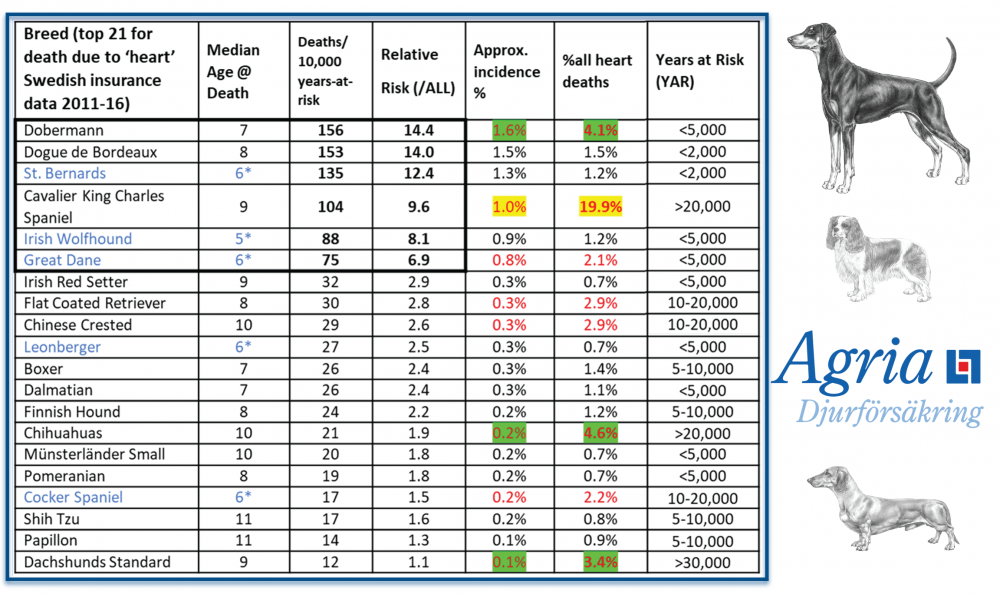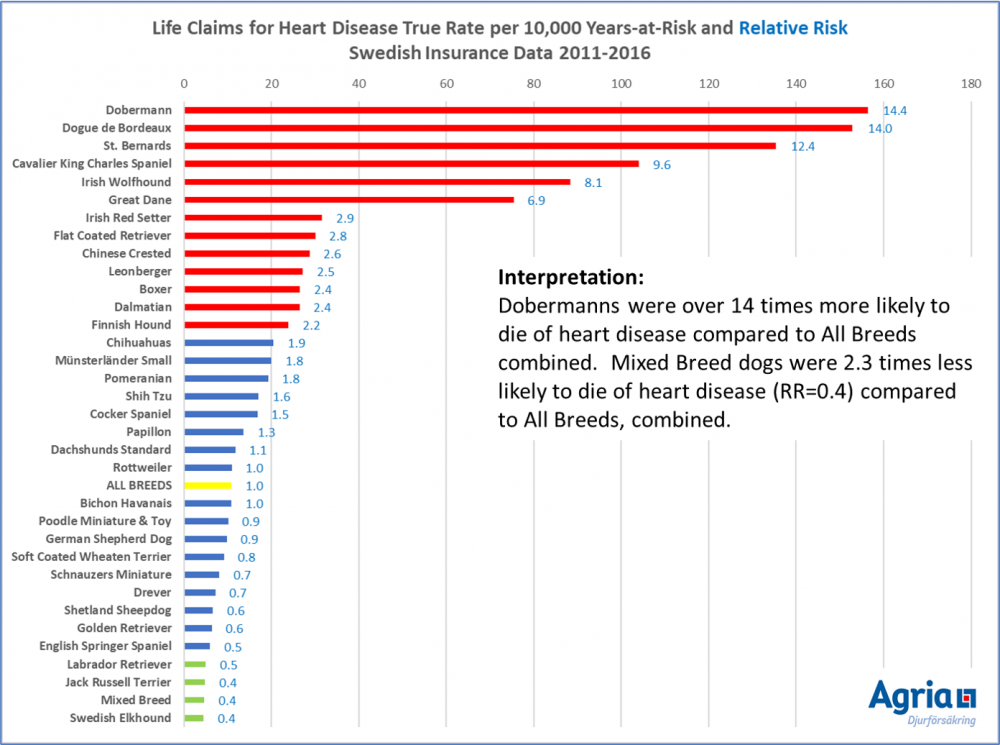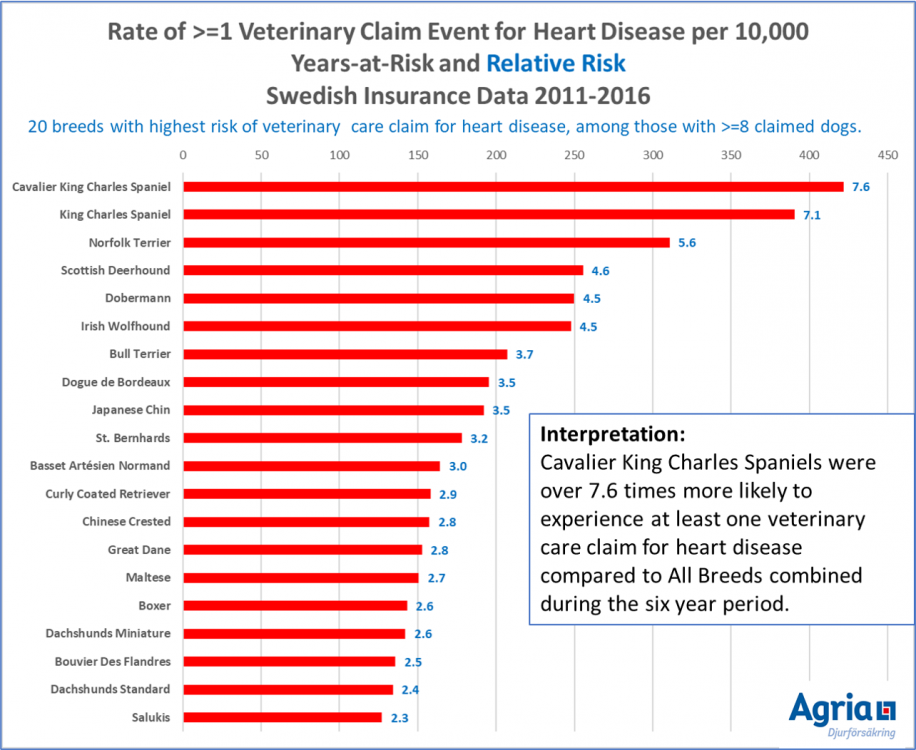This article is for owners, breeders, breed club health managers and veterinarians. It covers some highlights of breed-specific heart conditions.
Take home messages will be:
-
Breed risks of general and specific conditions
-
Health programs, pre-purchase and pre-breeding highlights/reminders
-
Breed specific examples by country
Cardiac disease, in many variations and forms, is frequently cited as being a condition of concern across different purebred dog breeds – and it is also a common clinical problem in dogs in general, including mixed breeds. Concern should not be surprising, given the likelihood for life-altering or fatal consequences of cardiac conditions. Clinical exams by primary care veterinary practitioners to detect the presence or absence of a heart condition are essential in management of dogs. Just as in the case of human heart defects/diseases, depending on the specific type, treatment protocols that can extend length and quality of life exist for management of some heart conditions in canines.
Table of Contents
Heart Disease Overview
Heart conditions exist in dogs; both mixed breed and purebred dogs can be impacted. Some purebred breeds have been shown to have a predisposition for experiencing specific heart conditions. Just as in humans, some conditions are congenital and present at birth or in the neonatal period; others develop at various ages; some arise in aged animals. Although the genetics of heart disease has been frequently studied, due to the complex nature of inheritance, few well-characterized genetic tests have been found (see below). Some examples of relatively common heart disease include, Degenerative Valve Disease (myxomatous valve disease); Dilated Cardiomyopathy, Patent Ductus Arteriosus (congenital), and Sub-Aortic Stenosis. There are innumerable sources of information on canine cardiac disease online and in the veterinary literature. This article will provide a brief overview of testing/evaluation methods, and comments on genetics/heritability. Further, we'll present some data, research and focus on examples of breed-specific approaches to management of heart conditions, i.e. breeding strategies.
What do Caretakers Need to Know?
-
Although any dog may experience heart disease, specific breeds or types are at higher risk for certain conditions.
-
Heart disease may be present at birth, or symptoms may occur at any age , depending on the condition; some heart conditions are not evident in some dogs/breeds till middle or old age (> 4-10 years).
-
Sudden death may occur or heart disease may be chronic or progressive.
-
Clinical examinations to determine how the heart is functioning are helpful to identify congenital cardiac disease and adult-onset cardiac disease. However, verification of specific diagnoses may be challenging.
-
There are varying levels of non-invasive diagnostic heart exams
-
Auscultation (listening with a stethoscope)
-
Thoracic x-rays
-
Echocardiograms; ultrasound
-
Holter readings, i.e. continuous monitoring over 24 hours or more (to detect arrhythmia, e.g. in Boxers and Doberman pinschers)
-
Veterinarians, please see: ACVIM's (2019) consensus guidelines for the diagnosis and treatment of myxomatous mitral valve disease in dogs.
-
For breed clubs and breeders, consensus on when testing is important and which test to use is complicated as there is much variation on defining the specifics of the specific heart condition - one size does not fit all. Screening strategies should depend on the breed and the specific conditions more common in that breed.
-
For breeders, ideally selection of breeding dogs involves common sense and due diligence, participating in pre-breeding evaluation testing of dogs in breeds shown to be affected by heart issues, and monitoring the status of dogs within pedigrees; breeding from older dogs ( >5 years) , particularly focus on using older males, and breeding from family lines with no evidence of heart issues in the extended pedigree.
-
Pre-purchase/ownership considerations for any dog, but especially for breeds known to be affected by heart conditions, are:
-
purchase your purebred pet from a health-informed breeder (one who does appropriate breed-specific health screening),
-
get regular (annual) veterinary exams for your dog
-
recognize / report to your dog's vet-tech and veterinarian any tell-tale symptoms that can be associated with heart trouble such as a lack of energy/activity, labored breathing, excessive panting, poor color of gums (bluish) or coughing.
What does the 'data' say about risk and prevalence in purebred breeds?
WSAVA - IPFD Article: Breed statistics for heart disease – clinicians’ perception of risk.
 NOTE: This write-up , intended for veterinarians, addresses perceptions and misperceptions of breed risk for cardiac disease, based on the challenges of clinical experience, and a dearth of valid, population-based estimates of breed risk in the veterinary literature.
NOTE: This write-up , intended for veterinarians, addresses perceptions and misperceptions of breed risk for cardiac disease, based on the challenges of clinical experience, and a dearth of valid, population-based estimates of breed risk in the veterinary literature.
"Practitioners gain an experiential perception of breed risk that is useful but can be misleading. Common breeds in the population may create an impression of exaggerated risk." Perceptions are affected not only by how common disease is within a breed, but also by how common the breed is in the population.
See the article for a full description and interpretation of the data in the chart below.
"Most notably, although in this 6-year period approx. 1% of all insured Cavaliers died of heart disease, they accounted for almost 20% of all heart-related deaths (they are both common and high risk). In this situation, the veterinarian would correctly identify this breed as being at high risk but over-estimate the number affected. In these data [Swedish Agria Insurance data], the entire base population is known, allowing calculation of actual incidence rates whereas many studies provide only proportions of sick or dead dogs attending a hospital(s). Unfortunately, some clinical studies might incorrectly report this proportion (i.e. the 20%) as ‘prevalence’. When discussing breed-risk, the data, analysis, and interpretation is key."

Read the WSAVA Article
Health Statistics
At the link above you will find DogWellNet's listing for breeds with Swedish Agria data as downloadable files.
Selected Agria Swedish Breed Profile links:
Breeds with Highest Risk for Death (Life Claim) and one or more Veterinary Care Events
Life Claims

Veterinary Care Events

Heart Testing Statistics
Breed and dog-specific data is available for heart testing results.
Breeding Strategies - selected breed examples
While the presence of heart disease has been studied worldwide and is recognized as a risk in breed populations in different countries, breeding strategies across borders can vary somewhat - based upon locality. As examples, information on management recommendations and requirements for testing for Cavalier King Charles Spaniels and Boxers is shown below. The range of approaches taken includes recognized/monitored/on radar, testing recommended to pre-breeding testing required.
Cavalier King Charles Spaniel
Boxer
Screening Highly Recommended
Screening Recommended
Strategy:
• To introduce mandatory cardiac arrest with auscultation by a class 1 specialist, in order to covered by puppy reference in SvB.
• To introduce voluntary cardiac examination with Doppler / ultrasound for publication in one register which is available on SvB's website.
6.4 Cardiac examination Objectives: - Inventory of the proportion of dogs with heart problems such as Aortic stenosis, Pulmonary stenosis and Cardiomyopathy. Strategy: register is available on SvB's website.
Breeding dogs are recommended to have at least an ultrasound examination (aortic and pulmonary stenosis) and a 5-minute cardiac film examination (ECG), as well as a Holter ECG (ARVC, arrhythmia cardiomyopathy).
Required: For all boxers who are being used for breeding for the first time, a cardiological Examination findings present (color Doppler ultrasound) from a BK recognized Investigation agency.
Boxers are not allowed to breed and are automatically banned from breeding... if the heart condition is grade 3 or worse.
Example - A Kennel Club Heart Evaluation Health Program - Purebred Dog Breeds
Finnish Kennel Club - PEVISA 2020
Breeds identified in this document as requiring pre-breeding heart testing (AUS and/or EKG) are: Boxer, Cavalier King Charles Spaniel, Chihuahua, Doberman, Newfoundland, and the Great Dane.
Cardiac Disease and Genetic Testing – It’s complicated!
Many breeders of all varieties of dogs wish there were genetic tests available for assessing pre-breeding risks or to estimate risk.
There has been significant breed-specific research into cardiac conditions, particularly in those breeds where it is felt to be more common – e.g. Dobermans, Boxers, Cavalier King Charles Spaniels, Great Danes, etc. Almost without exception there has been little return in terms of a genetic risk test. With few exceptions the results have indicated that the disease is multivariate, complex in inheritance, and/or unknown contributing factors. A few studies have resulted in some important genes, and even some candidate mutations or possible risk-factor mutations. It is generally felt that for most breeds and most heart conditions, the current best options are breed-and-condition specific clinical examinations at key ages in the dog’s development – all of which would also support future genetic test development.
Breed-specific genetic tests currently available are:
Breeds offered: English Toy Terrier/black and tan, Manchester Terrier; Doberman, Giant Schnauzers
Research performed at the University of Minnesota, in collaboration with the University of Pennsylvania and the University of Prince Edward Island, has discovered that JDCM in Toy Manchester Terriers/English Toy Terriers is caused by an autosomal recessive mutation in a cardiac potassium channel. While currently still unpublished, there is an ongoing study of 500+ adult healthy Toy Manchester Terriers/English Toy Terriers, and none have had two copies of the mutation. There is a reasonable indication that for this specific form of cardiac disease in these specific breeds, the inheritance may be fully penetrant, meaning that all dogs with two copies of the mutation are at risk to develop JDCM.
Breeds: Standard Schnauzer
Research (Gilliam et al. 2016) into DCM in clinically affected standard schnauzers has discovered a rare RBM20 deletion and frameshift, that is a likely cause for this specific form of DCM in the Schnauzer. Investigation of the familial relationships indicate an autosomal recessive mode of inheritance. However, this discovery and genetic test may not account for all forms of cardiomyopathy in the breed.
Breeds: Doberman
Extensive, collaborative research has gone into investigating cardiomyopathy in the Doberman. Candidate genes and mutations have been identified, however, the results of the Meurs et al. (2012) study are evidence that any genetic test based on this mutation will not be a good indicator of risk for this disorder in Dobermans. There is currently (2019) still no useful marker test for this disorder. For more information on Doberman pinscher dilated cardiomyopathy research see NCSU's website and the webinar: 2019 Doberman DCM Update & DCM2 Gene
Breeds: Boxer
Current research and evidence indicate that this genetic test is not considered diagnostic at this time. The mode of inheritance appears to be multivariate, or possibly autosomal dominant with low incomplete penetrance. Expert advice on using test results for breeding decisions recommended, as it is not clear the quality of disease-risk or inheritance-risk association.
Other Research/Genes identified:
-
Dilated Cardiomyopathy, (DCM); Doberman Pinscher (USA)
-
PDK4 unpublished | No test/mutation publication information.
-
Cardiomyopathy, dilated, PLN-related
-
Cardiomyopathy and juvenile mortality
Research References (Genetics)
Gilliam, H. Douglas Jr. (2016): Molecular Genetic Studies of Canine Inherited Diseases Including Sams, Neuronal Ceroid Lipofuscinosis and Dilated Cardiomyopathy. A Dissertation presented to the Faculty of the Graduate School University of Missouri.
Meurs, K.M., Friedenberg, S.G., Kolb, J., Saripalli, C., Tonino, P., Woodruff, K., Olby, N.J., Keene, B.W., Adin, D.B., Yost, O.L., DeFrancesco, T.C., Lahmers, S., Tou, S., Shelton, G.D., Granzier, H. : A missense variant in the titin gene in Doberman pinscher dogs with familial dilated cardiomyopathy and sudden cardiac death. Hum Genet :, 2019. Pubmed reference: 30715562. DOI: 10.1007/s00439-019-01973-2.
Bionda, A., Cortellari, M., Bagardi, M., Frattini, S., Negro, A., Locatelli, C., Brambilla, P. G., & Crepaldi, P. (2020). A Genomic Study of Myxomatous Mitral Valve Disease in Cavalier King Charles Spaniels. Animals : an open access journal from MDPI, 10(10), 1895. https://doi.org/10.3390/ani10101895
IPFD and the World Small Animal Veterinary Association

See our series of articles in the WSAVA Bulletin.

And IPFD:
References
Mattin, M. J., Boswood, A., Church, D. B., López-Alvarez, J., McGreevy, P. D., O'Neill, D. G., Thomson, P. C., & Brodbelt, D. C. (2015). Prevalence of and risk factors for degenerative mitral valve disease in dogs attending primary-care veterinary practices in England. Journal of veterinary internal medicine, 29(3), 847–854. https://doi.org/10.1111/jvim.12591
Canine Diseases With Familial or Breed Predispositions
Oberbauer AM, Belanger JM, Bellumori T, Bannasch DL, Famula TR. Ten inherited disorders in purebred dogs by functional breed groupings. Canine Genet Epidemiol. 2015 Jul 11;2:9. doi: 10.1186/s40575-015-0021-x. PMID: 26401337; PMCID: PMC4579393.
UK: The Kennel Club: Heart Scheme for Cavalier King Charles Spaniels
Kaplan JL, Stern JA, Fascetti AJ, Larsen JA, Skolnik H, Peddle GD, et al. (2018) Correction: Taurine deficiency and dilated cardiomyopathy in golden retrievers fed commercial diets. PLoS ONE 13(12): e0210233. https://doi.org/10.1371/journal.pone.0210233
Keene, BW,
Atkins, CE,
Bonagura, JD, et al.
ACVIM consensus guidelines for the diagnosis and treatment of myxomatous mitral valve disease in dogs. J Vet Intern Med.
2019;
33:
1127–
1140.
https://doi.org/10.1111/jvim.15488
Dutton, E. and López‐Alvarez, J. (2018), An update on canine cardiomyopathies – is it all in the genes?. J Small Anim Pract, 59: 455-464.
Additional References
Chihuahua - Vet Compass
Cavalier King Charles Spaniel
New Vet Compass paper: Common disorders in Cavalier King Charles spaniels
UK: BHCP: UK Newfoundland

 Donate
Donate







Recommended Comments
There are no comments to display.
Join the conversation
You can post now and register later. If you have an account, sign in now to post with your account.
Note: Your post will require moderator approval before it will be visible.